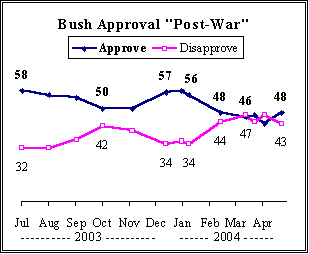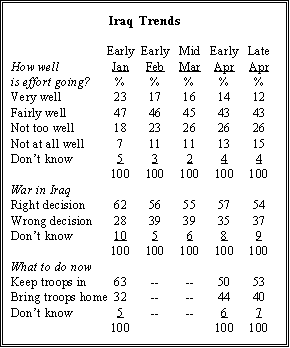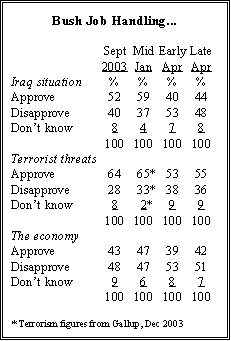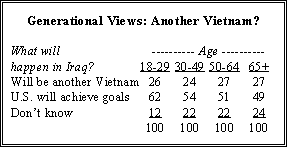Summary of Findings

President Bush’s approval ratings have improved over the month of April even as Americans continue to express strong concerns about Iraq and the way the president is handling that situation. The latest nationwide survey by the Pew Research Center finds 48% approving and 43% disapproving of Bush’s overall job performance. This is slightly better than the 43% rating he received in early April, conducted in the days immediately following the murder and mutilation of American contractors in Falluja.
While the president’s overall job scores are up, a slim plurality of Americans (48%) disapprove of the way he is dealing with Iraq, and just 36% think Bush has a clear plan for bringing the situation in Iraq to a successful conclusion. Nonetheless, these evaluations are no worse and if anything slightly better than they were in Pew’s previous survey, conducted April 1-4.

Further, nearly a month of bad news of mounting casualties and growing instability in Iraq have not resulted in a sea change in opinions about Iraq policy. Most Americans continue to say the U.S. made the right decision to go to war (54% now, 57% in early April). Moreover, 53% favor keeping U.S. forces in Iraq until a stable government is established, compared with 40% who support withdrawing the troops as soon as possible. This measure also has changed little from early April (50%-44%).
While some recent nationwide polls have found many Americans expressing concern that Iraq might turn into another Vietnam, just 25% think that Iraq will turn out to be another Vietnam; a 54% majority believes that the U.S. will accomplish its goals there. There is a wide partisan disparity on this issue, as a 41% plurality of Democrats believe Iraq will become another Vietnam while Republicans overwhelmingly reject that idea (80%). But age is not a factor in these attitudes. Americans in the mid-40s and older those who personally remember the Vietnam War are no more likely to see parallels between Iraq and Vietnam than are younger people.

The latest Pew Research Center survey, conducted April 21-25 among 1,000 adults, finds that a majority of Americans (55%) continue to approve of Bush’s handling of terrorist threats. But Bush’s standing on this issue has eroded noticeably since last year; in December 2003, 65% approved of his job in handling terrorist threats. In addition, only about four-in-ten (42%) approve of the way Bush is handling the economy, while 51% disapprove.
There has been a slight uptick in the percentage of Americans who rate the economy positively (38% now, 31% in February). But perceptions of the employment picture have not brightened; just 30% say there are plenty of jobs available in their community, virtually unchanged from February (31%). A majority of Americans (57%) continue to say that jobs are difficult to find in their area.
Age and Vietnam Parallels
Most Americans do not believe that the situation in Iraq will turn out to be another Vietnam, and this view is shared by those who lived through the Vietnam war era and by those too young to remember it. Among people age 50-64 roughly, those who were in their teens and 20s during the height of the war just 27% think Iraq will turn out like Vietnam; 51% say the U.S. will accomplish its goals. Views among those age 65 and older are virtually identical.

Young people are no different in the belief that Iraq will be another Vietnam, but more young people than others in the survey think the U.S. will accomplish its goals there. More than six-in-ten of those age 30 and under (62%) believe the U.S. will accomplish its goals in Iraq.
In general, young people are as supportive of the decision to go to war as are older Americans and a solid majority of those under age 30 (61%) think things there are going at least fairly well. By comparison, only half of those age 50 and older agree in that positive assessment.
Despite their optimistic outlook, however, young people also stand out in their support for a quick withdrawal of U.S. forces from Iraq. Nearly half of those age 30 and younger (47%) say the United States should pull its troops from Iraq as soon as possible, significantly more than any other group.
Aside from age, education is also related to peoples’ views on what the U.S. should do in Iraq. While people with more education hold no different views from the rest of the nation regarding whether it was the right decision to take military action in Iraq in the first place, there is a significant educational gap over staying the course. College graduates overwhelmingly favor keeping troops in Iraq until a stable government is established there (by a 67% to 27% margin), and people who have had some college generally agree (57% vs. 35% who want to bring troops home). But those with no more than a high school diploma are divided on this question, with nearly half (49%) saying the U.S. should bring its troops home as soon as possible, and just 44% preferring to keep troops in Iraq.

